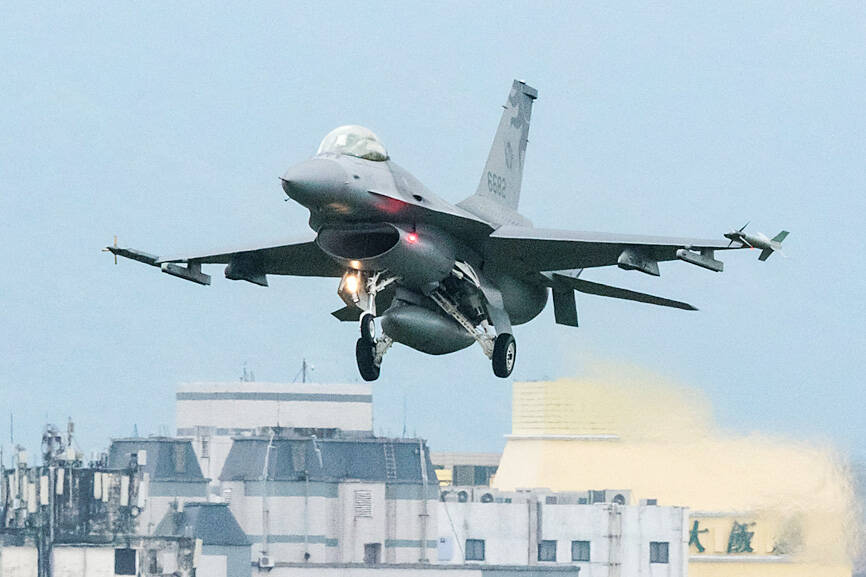Taiwan has signed an NT$11.25 billion (US$345.5 million) contract with the US to procure infrared search and track (IRST) systems that, according to a military source, are to be used for F-16V jets.
A notice posted yesterday on the Government e-Procurement System said that the deal to procure the systems was signed by the Ministry of Defense’s Defense Mission to the US and the American Institute in Taiwan on June 25.
The contract is valid from the day it was signed to Dec. 31, 2030.

Photo: Yasuyoshi Chiba, AFP
The systems, which were first announced in an arms sale package of the IRST systems and 16 related items on Aug. 23 last year, would be used on Taiwan’s fleet of 66 F-16V jets ordered from the US, a military source with knowledge of the matter said.
According to the notice on the procurement system, the contract’s supervising agency is the air force, with an address corresponding to the Zhi-Hang Air Base in Taitung County, where the F-16Vs are to be stationed.
The ministry said the new-generation IRST systems were developed specifically for the F-16V and would vastly enhance the fighters’ target acquisition and tracking capabilities, as well as their overall air combat performance.
Shu Hsiao-huang (舒孝煌), an expert at the Institute for National Defense and Security Research, last year told reporters that the IRSTs could be effectively deployed against China’s fifth-generation fighters.
The systems are capable of picking up heat signatures emitted by aircraft such as engine exhausts, and heat generated by friction between the fuselage and the air, giving it the upper hand on China’s new fighters, which would be otherwise hard to detect due to their compact radar cross-section, Shu said.

CHAOS: Iranians took to the streets playing celebratory music after reports of Khamenei’s death on Saturday, while mourners also gathered in Tehran yesterday Iranian Supreme Leader Ayatollah Ali Khamenei was killed in a major attack on Iran launched by Israel and the US, throwing the future of the Islamic republic into doubt and raising the risk of regional instability. Iranian state television and the state-run IRNA news agency announced the 86-year-old’s death early yesterday. US President Donald Trump said it gave Iranians their “greatest chance” to “take back” their country. The announcements came after a joint US and Israeli aerial bombardment that targeted Iranian military and governmental sites. Trump said the “heavy and pinpoint bombing” would continue through the week or as long

TRUST: The KMT said it respected the US’ timing and considerations, and hoped it would continue to honor its commitments to helping Taiwan bolster its defenses and deterrence US President Donald Trump is delaying a multibillion-dollar arms sale to Taiwan to ensure his visit to Beijing is successful, a New York Times report said. The weapons sales package has stalled in the US Department of State, the report said, citing US officials it did not identify. The White House has told agencies not to push forward ahead of Trump’s meeting with Chinese President Xi Jinping (習近平), it said. The two last month held a phone call to discuss trade and geopolitical flashpoints ahead of the summit. Xi raised the Taiwan issue and urged the US to handle arms sales to

BIG SPENDERS: Foreign investors bought the most Taiwan equities since 2005, signaling confidence that an AI boom would continue to benefit chipmakers Taiwan Semiconductor Manufacturing Co’s (TSMC, 台積電) market capitalization swelled to US$2 trillion for the first time following a 4.25 percent rally in its American depositary receipts (ADR) overnight, putting the world’s biggest contract chipmaker sixth on the list of the world’s biggest companies by market capitalization, just behind Amazon.com Inc. The site CompaniesMarketcap.com ranked TSMC ahead of Saudi Aramco and Meta Platforms Inc. The Taiwanese company’s ADRs on Tuesday surged to US$385.75 on the New York Stock Exchange, as strong demand for artificial intelligence (AI) applications led to chip supply constraints and boost revenue growth to record-breaking levels. Each TSMC ADR represents

Pro-democracy media tycoon Jimmy Lai’s (黎智英) fraud conviction and prison sentence were yesterday overturned by a Hong Kong court, in a surprise legal decision that comes soon after Lai was jailed for 20 years on a separate national security charge. Judges Jeremy Poon (潘兆初), Anthea Pang (彭寶琴) and Derek Pang (彭偉昌) said in the judgement that they allowed the appeal from Lai, and another defendant in the case, to proceed, as a lower court judge had “erred.” “The Court of Appeal gave them leave to appeal against their conviction, allowed their appeals, quashed the convictions and set aside the sentences,” the judges